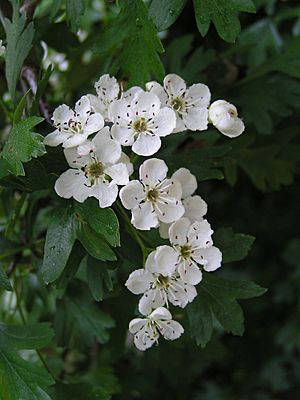Nuts in May (rhyme) facts for kids
Quick facts for kids "Nuts in May" |
|
|---|---|

Hawthorn blossom or "knots of may"
|
|
| Nursery rhyme | |
| Published | 1894–1898 |
| Songwriter(s) | Unknown |
"Nuts in May" is a fun singing game that children play. It involves two teams trying to pick a boy or girl from the other side. This game was first written down in the late 1800s. It's a classic children's game with a special number, Roud index 6308.
Contents
Playing "Nuts in May"
This game is played by two teams of children. They stand facing each other in two lines.
How to Play
First, one team skips forward while singing the opening part of the song:
- Here we come gathering nuts in May,
- Nuts in May, nuts in May,
- Here we come gathering nuts in May,
- On a cold and frosty morning.
After singing, they skip back to their starting spots. Then, the second team skips forward. They sing a similar verse, but they ask:
- Who will you have for nuts in May?
Once the first team chooses someone, they sing:
- We'll have [name] for nuts in May.
Next, the second team asks:
- Who will you send to fetch him/her away?
The first team then sings the last part of the song:
- We'll send [name] to fetch him/her away,
- Fetch him/her away, fetch him/her away,
- We'll send [name] to fetch him/her away,
- On a cold and frosty morning.
The Challenge
The two children who were chosen then walk to the middle. They hold hands and try to pull each other towards their own team's line. The child who gets pulled over joins the other team. Then, the game starts all over again!
This game is very similar to "Here We Go Round the Mulberry Bush". They even share the same tune and the last line of the song.
Where Did "Nuts in May" Come From?
The words and rules for "Nuts in May" were first written down in a book called the Folk-Lore Record in 1881. Another book, English Folk-rhymes by G. F. Northall, described it in 1882.
Early Records
The 1881 record said the game was played among girls. But Northall's book mentioned that a boy and a girl were chosen as partners. In 1886, Emmeline M. Plunket's book, Merry Games in Rhyme, also showed mixed teams. This book also included the music for the song.
The game was also known in the United States around the same time. However, it was thought to have come from England. Later, versions of the game were found in Canada, Jamaica, and New Zealand.
What Are "Nuts in May"?
Alice Gomme studied the game very closely. She collected different versions from all over Britain for her book, The Traditional Games of England, Scotland and Ireland (1894-1898). She wondered what "nuts in May" actually meant. It's confusing because nuts don't grow in the spring!
Gomme thought the original words might have been "knots of may". This means small bunches of hawthorn flowers. Hawthorn blossoms are also called "may" flowers. This idea connects the game to old May Day celebrations. These celebrations often happened early in the morning.
Some versions of the song use different lines like "On a fine summer’s morning" or "So early in the morning". These lines, along with "On a May morning early" from an American version, also suggest a link to May Day.
Some people think the game might be based on old customs from the 1600s. The poet Robert Herrick wrote about gathering white-thorn blossom and choosing partners in his poem "Corinna’s going a’ Maying". These old traditions might have slowly turned into the children's game we know today.
Images for kids
-
Here we are gathering nuts in May; by Elizabeth Adela Forbes
 | Janet Taylor Pickett |
 | Synthia Saint James |
 | Howardena Pindell |
 | Faith Ringgold |



